
Gérard Debreu was a French-born economist and mathematician. Best known as a professor of economics at the University of California, Berkeley, where he began work in 1962, he won the 1983 Nobel Memorial Prize in Economic Sciences.

Oskar Ryszard Lange was a Polish economist and diplomat. He is best known for advocating the use of market pricing tools in socialist systems and providing a model of market socialism. He responded to the economic calculation problem proposed by Ludwig von Mises and Friedrich Hayek by claiming that managers in a centrally-planned economy would be able to monitor supply and demand through increases and declines in inventories of goods, and advocated the nationalization of major industries. During his stay in the United States, Lange was an academic teacher and researcher in mathematical economics. Later in socialist Poland, he was a member of the Central Committee of the Polish United Workers' Party.

Harold Hotelling was an American mathematical statistician and an influential economic theorist, known for Hotelling's law, Hotelling's lemma, and Hotelling's rule in economics, as well as Hotelling's T-squared distribution in statistics. He also developed and named the principal component analysis method widely used in finance, statistics and computer science.
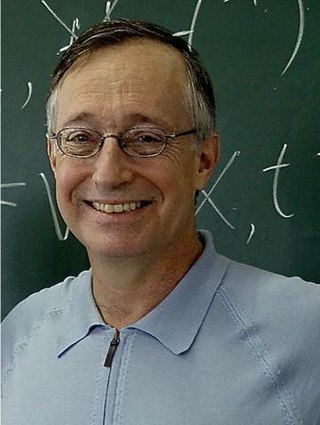
Paul Robert Milgrom is an American economist. He is the Shirley and Leonard Ely Professor of Humanities and Sciences at the Stanford University School of Humanities and Sciences, a position he has held since 1987. He is a professor in the Stanford School of Engineering as well and a Senior Fellow at the Stanford Institute for Economic Research. Milgrom is an expert in game theory, specifically auction theory and pricing strategies. He is the winner of the 2020 Nobel Memorial Prize in Economic Sciences, together with Robert B. Wilson, "for improvements to auction theory and inventions of new auction formats".
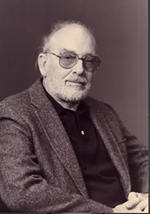
David Cass was a professor of economics at the University of Pennsylvania, mostly known for his contributions to general equilibrium theory. His most famous work was on the Ramsey–Cass–Koopmans model of economic growth.
Lionel Wilfred McKenzie was an American economist. He was the Wilson Professor Emeritus of Economics at the University of Rochester. He was born in Montezuma, Georgia. He completed undergraduate studies at Duke University in 1939 and subsequently moved to Oxford that year as a Rhodes Scholar. McKenzie worked with the Cowles Commission while it was in Chicago and served as an assistant professor at Duke from 1948 to 1957. Having received his Ph.D. at Princeton University in 1956, McKenzie moved to Rochester where he was responsible for the establishment of the graduate program in economics.
Turnpike theory refers to a set of economic theories about the optimal path of accumulation in a system, depending on the initial and final levels. In the context of a macroeconomic exogenous growth model, for example, it says that if an infinite optimal path is calculated, and an economic planner wishes to move an economy from one level of capital to another, as long as the planner has sufficient time, the most efficient path is to quickly move the level of capital stock to a level close to the infinite optimal path, and to allow capital to develop along that path until it is nearly the end of the desired term and the planner must move the capital stock to the desired final level. The name of the theory refers to the idea that a turnpike is the fastest route between two points which are far apart, even if it is not the most direct route.
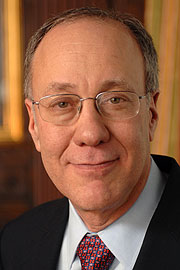
Roger Bruce Myerson is an American economist and professor at the University of Chicago. He holds the title of the David L. Pearson Distinguished Service Professor of Global Conflict Studies at The Pearson Institute for the Study and Resolution of Global Conflicts in the Harris School of Public Policy, the Griffin Department of Economics, and the college. Previously, he held the title The Glen A. Lloyd Distinguished Service Professor of Economics. In 2007, he was the winner of the Sveriges Riksbank Prize in Economic Sciences in Memory of Alfred Nobel with Leonid Hurwicz and Eric Maskin for "having laid the foundations of mechanism design theory." He was elected a Member of the American Philosophical Society in 2019.
Roy Radner was Leonard N. Stern School Professor of Business at New York University. He was a micro-economic theorist. Radner's research interests included strategic analysis of climate change, bounded rationality, game-theoretic models of corruption, pricing of information goods and statistical theory of data mining. Previously he was a faculty member at the University of California, Berkeley, and a Distinguished Member of Technical Staff at AT&T Bell Laboratories.
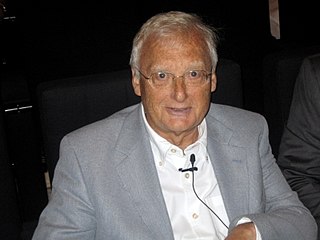
Hans Föllmer is a German mathematician, currently professor emeritus at the Humboldt University of Berlin, visiting professor at the National University of Singapore, and Andrew D. White Professor-at-Large at Cornell University. He was awarded the Cantor medal in 2006. In 2007 he became doctor honoris causa at the Paris Dauphine University.
Roger Guesnerie is an economist born in France in 1943. He is currently the Chaired Professor of Economic Theory and Social Organization of the Collège de France, Director of Studies at the École des hautes études en sciences sociales, and the chairman of the board of directors of the Paris School of Economics.
In economic theory, a strategicmarket game, also known as a market game, is a game explaining price formation through game theory, typically implementing a general equilibrium outcome as a Nash equilibrium.
Xavier Vives is a Spanish economist regarded as one of the main figures in the field of industrial organization and, more broadly, microeconomics. He is currently Chaired Professor of Regulation, Competition and Public Policies, and academic director of the Public-Private Sector Research Center at IESE Business School in Barcelona.

Arunava Sen is a professor of economics at the Indian Statistical Institute. He works on Game Theory, Social Choice Theory, Mechanism Design, Voting and Auctions.
In microeconomics, excess demand, also known as shortage, is a phenomenon where the demand for goods and services exceeds that which the firms can produce.
The term gross substitutes is used in two slightly different meanings:
- In microeconomics, two commodities and are called gross substitutes, if . I.e., an increase in the price of one commodity causes people to want strictly more of the other commodity, since the commodities can substitute each other.
- In auction theory and competitive equilibrium theory, a valuation function is said to have the gross substitutes (GS) property if for all pairs of commodities: . I.e., the definition includes both substitute goods and independent goods, and only rules out complementary goods. See Gross substitutes.
The Journal of Mathematical Economics is a bimonthly peer-reviewed academic journal of mathematical economics published by Elsevier. It covers work in economic theory that expresses economic ideas using formal mathematical reasoning. The journal was established in 1974, with Werner Hildenbrand as the founding editor-in-chief. The current editor-in-chief is Andres Carvajal. According to the Journal Citation Reports, the journal has a 2018 5-year impact factor of 0.725.
Charles Frederick Roos was an American economist who made contributions to mathematical economics. He was one of the founders of the Econometric Society together with American economist Irving Fisher and Norwegian economist Ragnar Frisch in 1930. He served as secretary-treasurer during the first year of the society and was elected as president in 1948. He was director of research of the Cowles Commission from September 1934 to January 1937.
Anna Mikusheva is the Professor of Economics at Massachusetts Institute of Technology. She was the 2012 recipient of the Elaine Bennett Research Prize, a bi-annual prize that recognizes and celebrates research by a woman in the field of Economics, and was selected as a Sloan Research Fellow in 2013. She is a co-editor of the journal Econometric Theory.
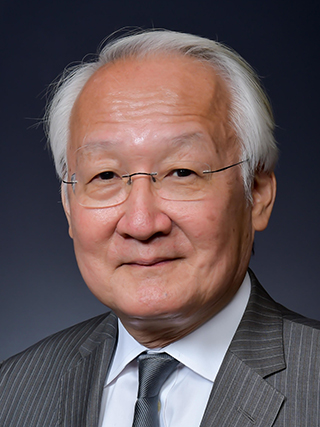
Makoto Yano is a Japanese economist, currently the president and chief research officer of the Research Institute of Economy, Trade and Industry. He is also a professor emeritus at Kyoto University and a professor by special appointment at Kyoto University's Institute of Economic Research and Sophia University.








